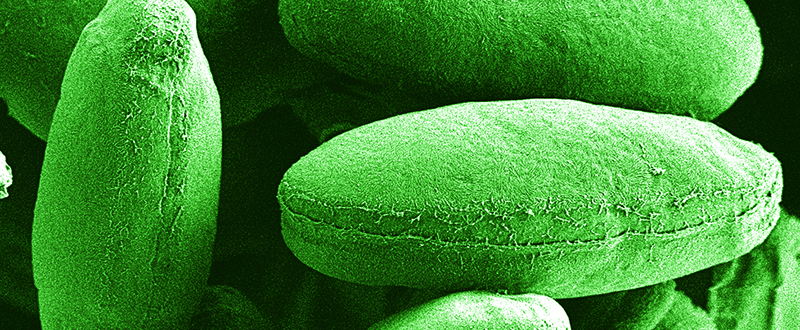Feature: Western Researchers using algae to help quickly produce COVID-19 test kits

Image taken by Thomas J. Deerinck, National Center for Microscopy and Imaging Research, University of California, San Diego
Thanks to new funding from Mitacs, Western University researchers are collaborating with Suncor to rapidly develop serological test kits for COVID-19 that would determine if someone has been previously infected and has the antibodies for the virus. They are employing a method that uses algae as a way to produce the testing reagent.
Researchers Daniel Giguere and Sam Slattery, PhD candidates at Western University’s Schulich School of Medicine & Dentistry, are working on developing the algae as a production factory in order to make the proteins needed to identify if someone has been previously infected or carries antibodies for COVID-19. Other tests currently being developed rely on proteins made in reagents such as insect or mammalian cells which are expensive and difficult to scale.
“We are using a microalgae that shows a lot of promise for not only producing the protein needed, but producing it with the correct modifications to mimic how it's made in humans” said Giguere.
“We are leveraging our in-house expertise and technology to rapidly produce the proteins and validate their effectiveness as a testing reagent,” added Slattery.
Giguere and Slattery are supervised by principal investigators Dave Edgell, PhD, Bogumil Karas, PhD, and Greg Gloor, PhD in the Department of Biochemistry at Schulich Medicine & Dentistry.
“One of the limiting factors in developing large scale serological testing is the ability to make significant quantities of the viral proteins on a cost-effective basis. Algae are extremely cheap to grow and can easily be engineered to produce the viral proteins. The synthetic biology group at Western has been developing genetic tools for algae that are now proving their utility,” said Edgell.
Martin Flatley, PhD, Suncor Senior Staff Engineer based in Sarnia, says the Mitacs funding has enabled the team to significantly speed up the production process, with the test kits expected to be on the market in a couple of months.
“We already had the equipment and expertise, and access to the Western University bio-safety lab, so we thought ‘how can use what we developed together to fight COVID-19?” Flatley explained. “It’s a great feeling knowing that we’re doing this for the benefit of all Canadians.”
The funding is part of an announcement that Mitacs is partnering with NSERC, the Natural Sciences and Engineering Research Council of Canada, to expedite the approval process and leverage funding for COVID-19-related research projects.








